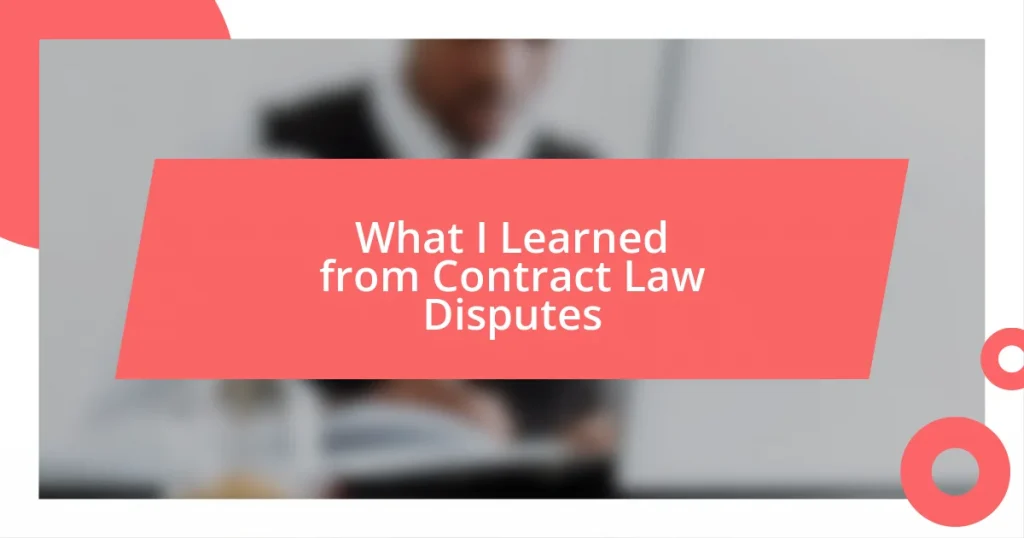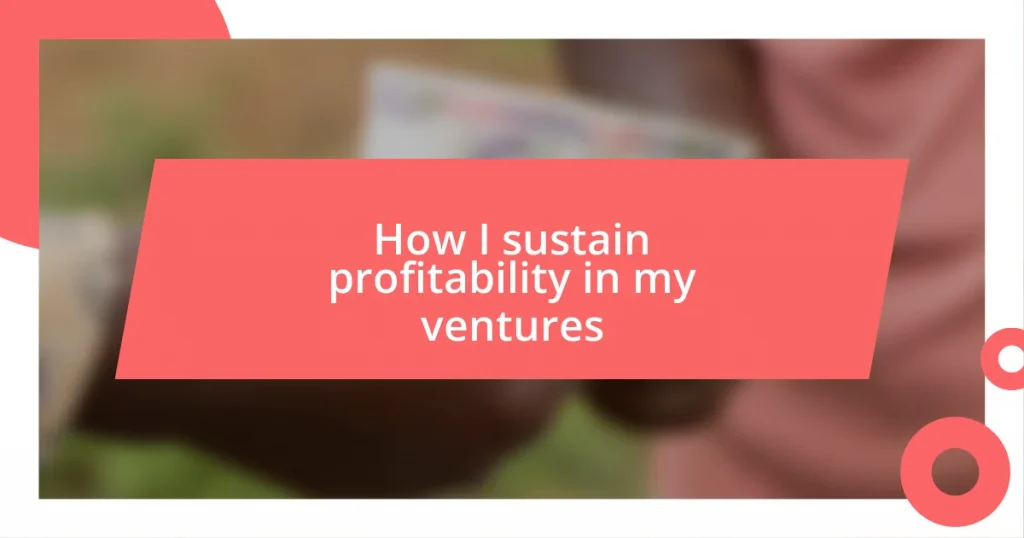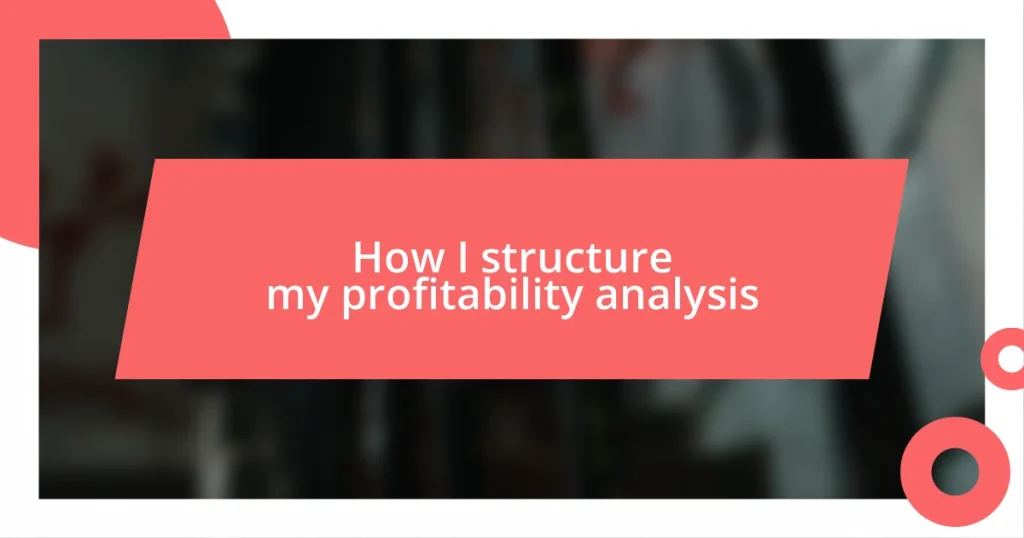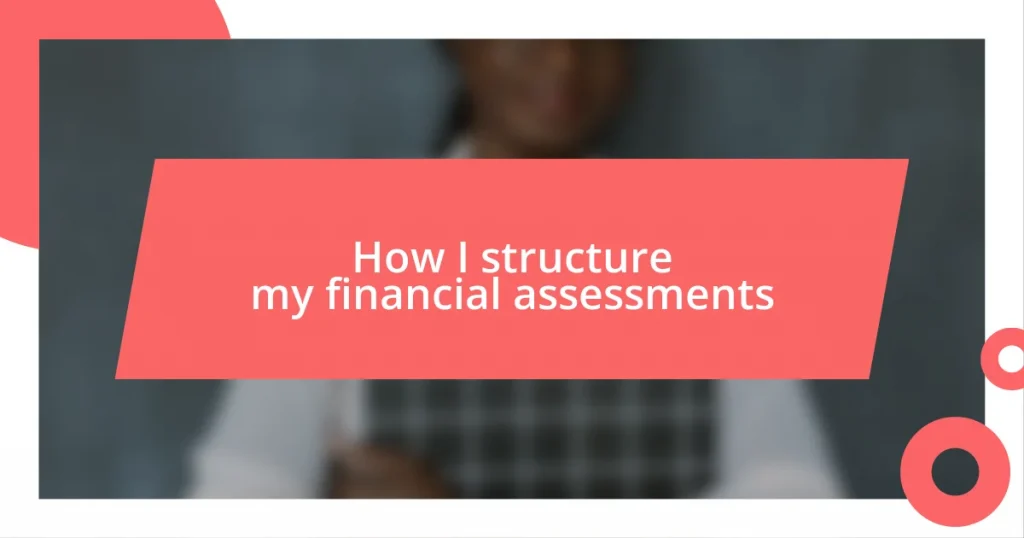Key takeaways:
- Clear communication and well-defined contracts are essential to prevent misunderstandings and disputes in any agreement.
- Proactive measures such as regular check-ins and structured reviews can significantly reduce the risk of conflicts during a project.
- Seeking legal consultation can provide valuable insights and protect against potential liabilities, highlighting the importance of guidance before issues escalate.
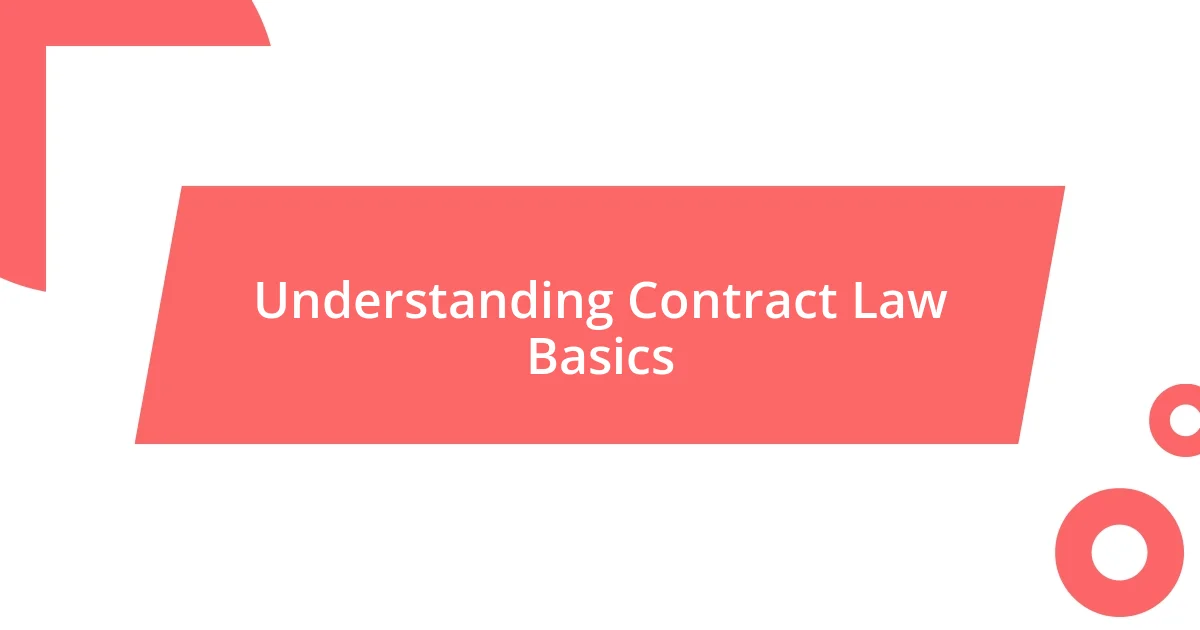
Understanding Contract Law Basics
Contract law is fundamentally about agreements and their enforceability. I remember my first encounter with a contract dispute; it was over a home renovation. I thought we had a clear understanding, but as the work progressed, the scope changed, and misunderstandings arose. This experience taught me that clarity and mutual agreement are vital in drafting any contract.
Another crucial aspect of contract law is the idea of consideration, which refers to the value exchanged between parties. When I was negotiating a freelance project, I realized how essential it was to define what both sides were offering and receiving. Have you ever entered an agreement without fully appreciating what you’re giving up? It’s a pitfall I’ve seen many fall into, leading to dissatisfaction and disputes that could have been avoided with clearer terms.
In my experience, written contracts are invaluable. They provide a tangible reference point when disagreements arise. I once had a friend who relied solely on verbal agreements, and when disputes emerged, it became a battle of ‘he said, she said.’ This made me appreciate how contracts, even simple ones, can save time and heartache down the line. Wouldn’t you prefer to have a clear record to back your claims when issues pop up?
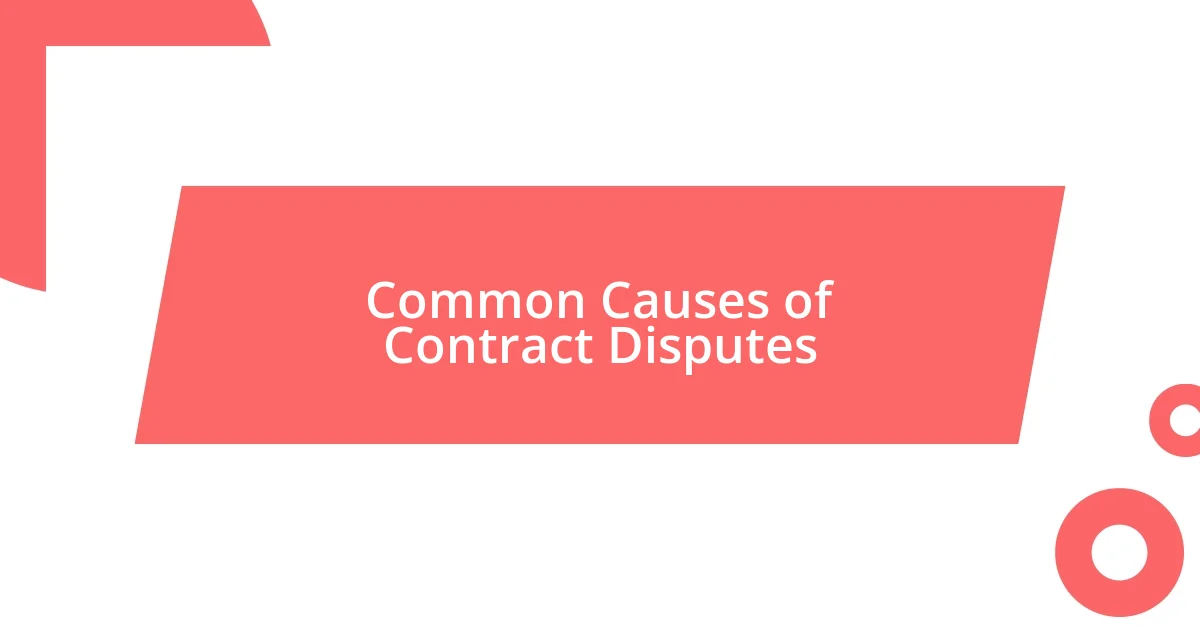
Common Causes of Contract Disputes
When delving into contract disputes, I’ve noticed that some common causes frequently emerge. One standout reason is ambiguity in contract language. I recall a situation where I signed a lease that appeared straightforward, but vague terms regarding maintenance responsibilities led to a year of frustration. The lack of precise definitions can create significant barriers, often leading to bitter disagreements that could have been avoided.
Here are some typical causes of contract disputes:
– Ambiguous Language: Terms that can be interpreted in multiple ways.
– Scope Creep: Unclear project parameters leading to unmet expectations.
– Failure to Meet Deadlines: Delays that impact project outcomes.
– Disagreements Over Payment Terms: Different interpretations of what was promised.
– Changes in Circumstances: External factors affecting the ability to fulfill contract obligations.
In my experience, these issues often stem from a lack of communication. For instance, I once worked on a collaborative project where everyone had different interpretations of deadlines. It resulted in chaos and mounting stress. Just like in relationships, clear communication and defined expectations are critical for a contract to thrive.
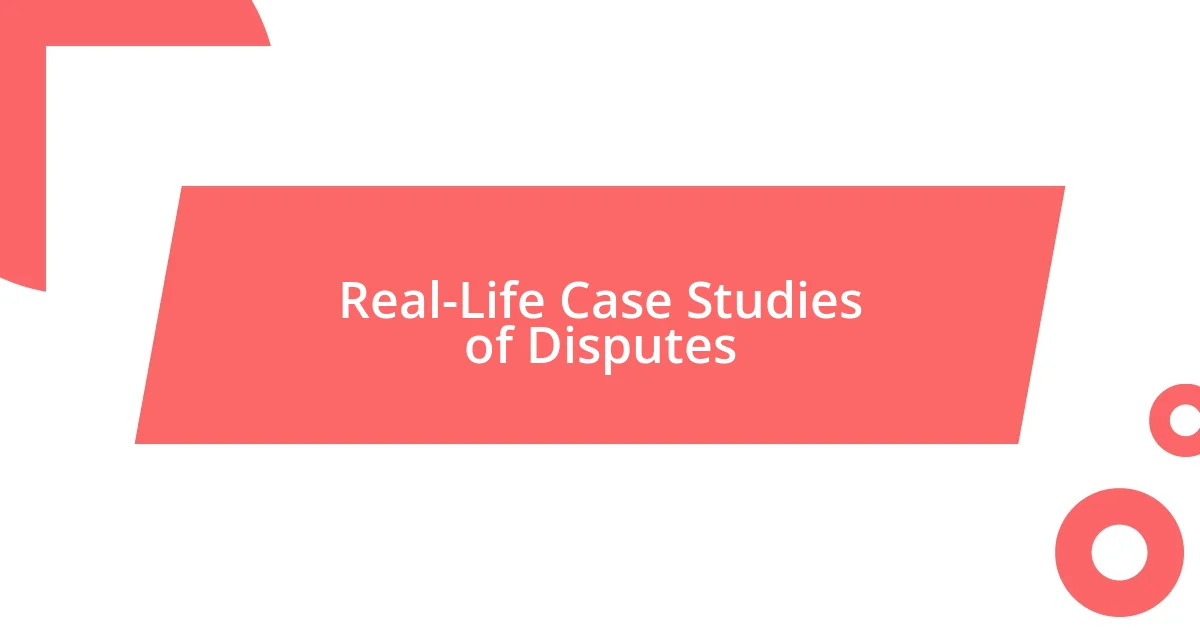
Real-Life Case Studies of Disputes
There’s often a lot more going on beneath the surface in contract disputes than what appears at first glance. I remember a case involving a local restaurant and a catering supplier. The restaurant owner thought they had an exclusive agreement, while the supplier insisted they could work with other clients. This misunderstanding, rooted in a lack of clarity in their written contract, resulted in a legal battle that dragged on far longer than necessary. It served as a reminder to me that what we assume is clear can often lead to conflict.
Another interesting scenario I encountered was between a freelance designer and a tech startup. The designer completed the work but found out that the startup intended to use it in ways that were never discussed. The frustration was palpable on both sides. The designer felt taken advantage of, while the startup believed they were within their rights. These types of disputes highlight the need for comprehensive contracts that clearly outline both the usage rights and deliverables.
A personal experience comes to mind, too, when I think about a disagreement over a service contract I had with a contractor. For weeks, we exchanged emails filled with requests that pertained to deliverables and timelines. When the contractor missed deadlines, our relationship soured quickly. Reflecting on this, I learned how important it is to establish a shared understanding upfront to prevent conflicts from escalating.
| Case | Key Issue |
|---|---|
| Restaurant & Catering Supplier | Ambiguity in exclusivity agreement |
| Freelance Designer & Tech Startup | Misunderstanding of usage rights |
| Personal Contractor Experience | Failure to meet specified deadlines |
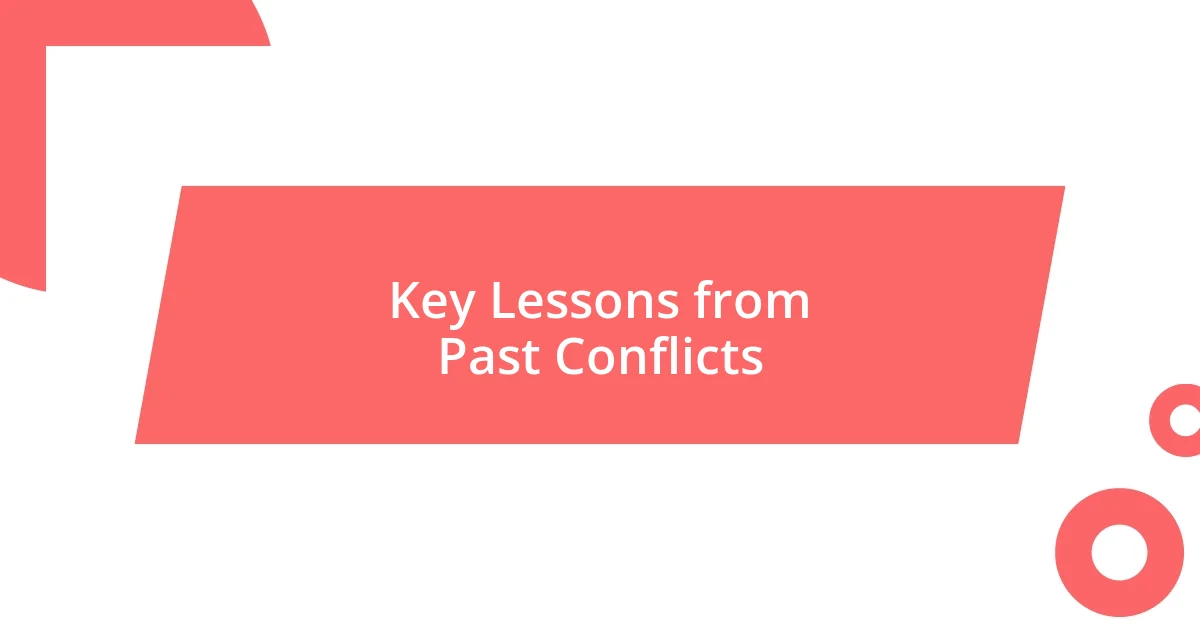
Key Lessons from Past Conflicts
Reflecting on past conflicts, one crucial lesson is the power of clarity in communication. I remember a partnership where my co-founder and I had different expectations about ownership percentages. We assumed we were on the same page, but disagreements erupted when it came time to distribute profits. It taught me that explicit, transparent conversations about expectations can be the difference between a thriving partnership and a tangled mess of resentment.
Another key lesson I hold close is the importance of adaptability. In a contract negotiation with a supplier, we faced unforeseen price hikes due to market changes. Initially, I felt frustrated, but adapting our agreement to include a flexible approach helped avert prolonged disputes. Asking, “How can we adjust without losing value for both sides?” became transformative, highlighting that flexibility often leads to win-win scenarios.
I’ve also found that documentation is not just a formality; it’s a safeguard. A dispute I witnessed over a verbal agreement made me realize how quickly assumptions can lead to conflict. While chatting with a colleague about project responsibilities, we mistakenly thought our verbal commitments sufficed. When expectations weren’t met, it became a heated debate. This experience reinforced in me the notion that comprehensive documentation of what was agreed upon is essential to uphold trust and prevent misunderstandings. Who wouldn’t want to avoid that kind of chaos?
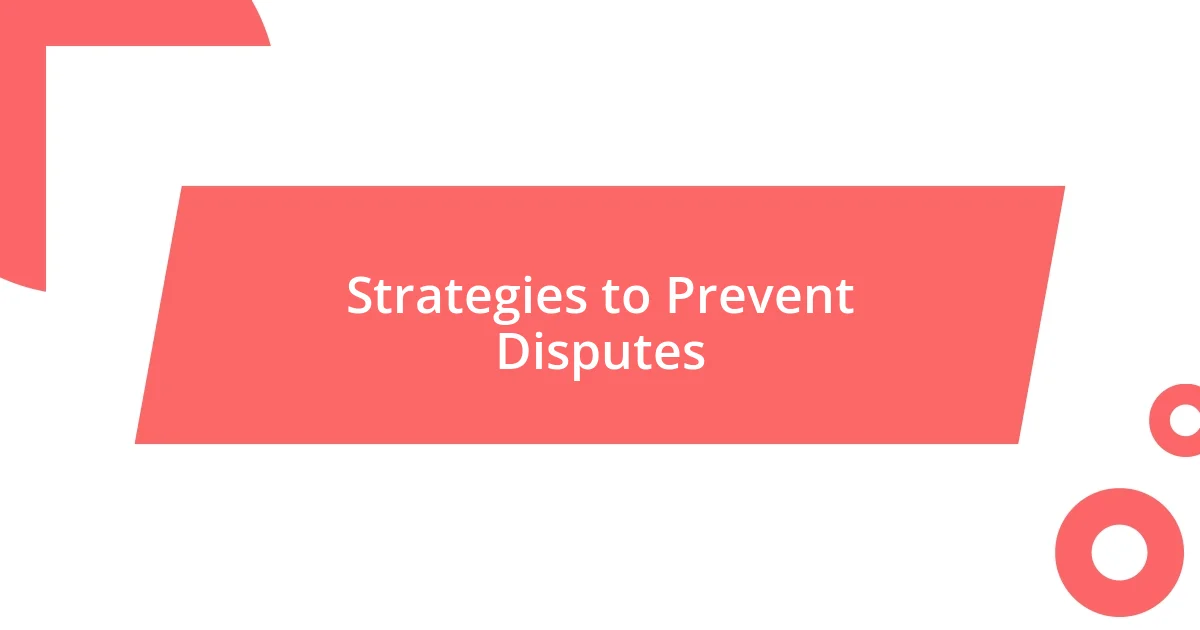
Strategies to Prevent Disputes
When it comes to preventing disputes, I can’t stress enough how vital it is to establish clear expectations from the beginning. I once worked on a project with a team where we decided on roles and responsibilities, but we didn’t put anything into writing right away. As the project progressed, it became clear that everyone had different interpretations of their tasks. That mix-up could have led to friction, but thankfully, we took a moment to regroup and clarify our roles—one simple conversation saved us from a potential fallout.
Another effective strategy I’ve learned is to foster open lines of communication throughout the duration of a contract. There was a time when I managed a small event planning company, and we had a recurring client. Instead of waiting for potential issues to bubble up, I made it a point to check in regularly. This proactive approach allowed us to address any concerns early, which not only strengthened our relationship but also minimized the risk of disputes. Isn’t it amazing how just a little communication can go a long way?
Finally, I’ve found that having a structured review process can work wonders in keeping everyone aligned. In one instance, I had a freelance project that spanned several months. Rather than waiting until the end to evaluate progress, I established regular milestone reviews with the client. These sessions provided an opportunity to discuss any adjustments needed and re-align on project objectives. It turned out to be such a productive way to keep misunderstandings at bay. How often do we miss the chance to recalibrate our expectations? Regular check-ins can truly be a game changer.
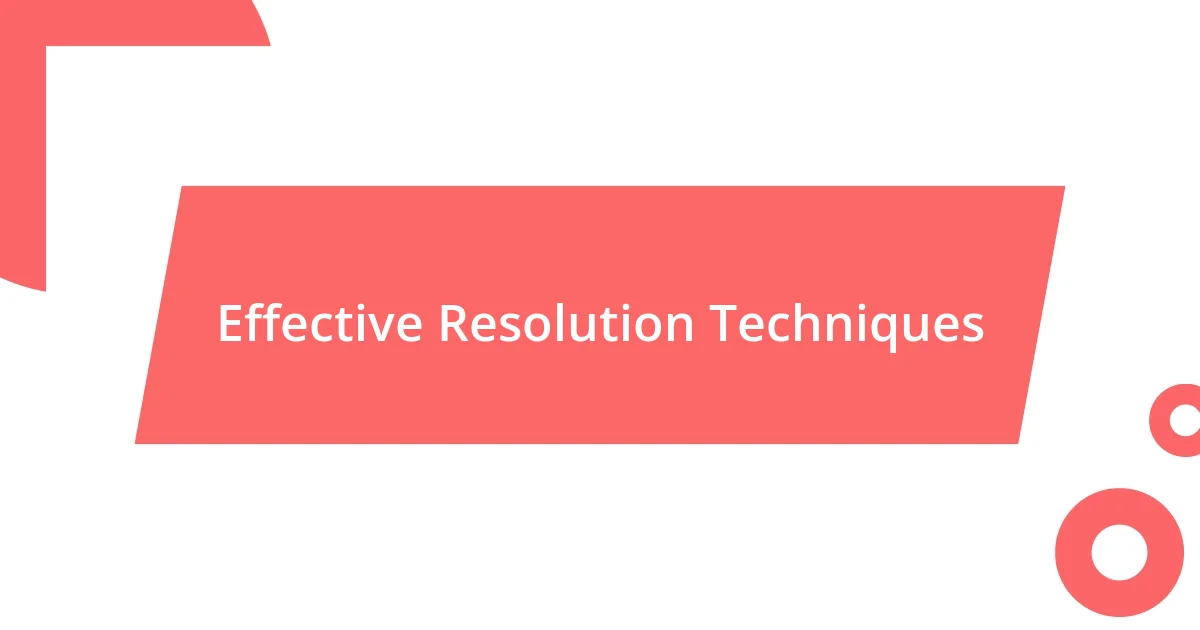
Effective Resolution Techniques
One of the most effective resolution techniques I’ve encountered is the art of mediation. I once found myself stuck in a contentious disagreement with a contractor over project timelines. Initially, our discussions had become a blame game, leading nowhere. I suggested bringing in a neutral third party to mediate our conversation. This unexpected move turned the tide; we were able to express our concerns with someone guiding the dialogue. The mediator helped us focus on solutions rather than grievances, transforming a tense standoff into a collaborative moment.
Another approach that has proven invaluable is the use of ‘interest-based negotiation.’ Reflecting on a particularly challenging disagreement over deliverables, I realized that merely stating positions didn’t lead to a resolution. Instead, I started to ask questions like, “What can we both gain here?” Understanding that everyone involved has underlying interests shifted my perspective tremendously. It allowed for creative solutions that addressed the needs of both parties. I can’t help but wonder: how often do we focus too much on our own positions without considering the other side’s needs?
I also firmly believe in the power of positive framing when discussions go awry. During a contract review session, I felt the tension rising over some discrepancies in invoices. Instead of pointing fingers, I decided to frame my concerns positively, saying, “I see potential for improvement in how we document expenses together.” This simple shift paved the way for a constructive conversation, enabling us to identify and rectify issues without creating defensiveness. Isn’t it fascinating how the way we word things can impact an entire conversation? Adopting a positive framing technique can not only diffuse tension but also foster a spirit of collaboration.
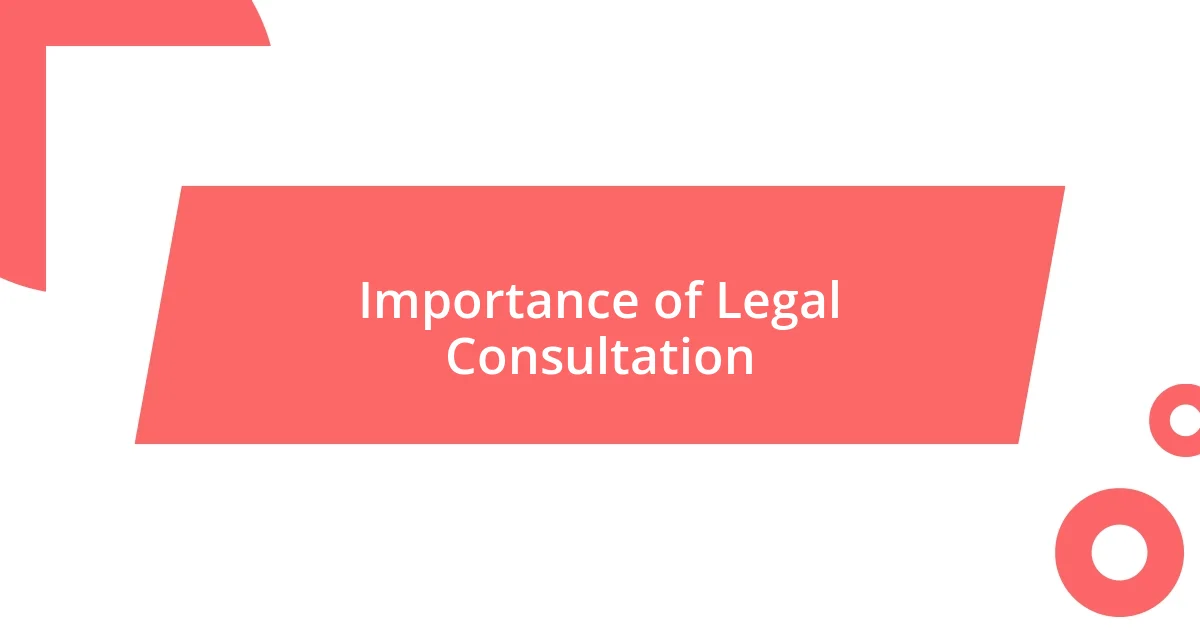
Importance of Legal Consultation
Seeking legal consultation is crucial in navigating contract law disputes. I remember a time when I encountered a situation where a partner wanted to revise terms without fully understanding the implications. After I consulted with an attorney, I found out that the changes could expose us to significant liabilities. It was a real eye-opener for me—having that legal guidance changed our entire approach to the agreement.
In my experience, legal advice can often help me see the bigger picture. There have been instances when I felt overwhelmed by the intricacies of contract language. A single consultation often illuminated aspects I hadn’t considered, like hidden clauses or potential pitfalls. I’ve learned that enlisting a lawyer isn’t just about handling disputes; it’s about proactively protecting my interests before issues arise.
I sometimes wonder how many people overlook the value of legal consultation until it’s too late. Just the other day, I spoke with a friend who faced a dispute over a business deal. He didn’t seek legal advice until tensions escalated, and by then, the damage was done. If only he had reached out for guidance early on! An ounce of prevention truly is worth a pound of cure in the world of contracts.










